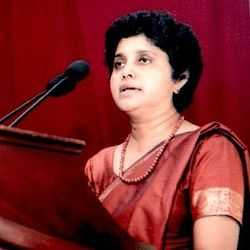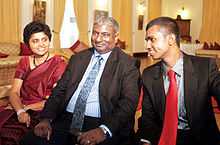Shirani Bandaranayake
| Shirani Bandaranayake | |
|---|---|
 | |
| 43rd Chief Justice of Sri Lanka | |
| In office 18 May 2011 – 13 January 2013 | |
| Appointed by | Mahinda Rajapaksa |
| Preceded by | Asoka de Silva |
| Succeeded by | Mohan Peiris |
| Personal details | |
| Born | Upatissa Atapattu Bandaranayake Wasala Mudiyanse Ralahamilage Shirani Anshumala Bandaranayake April 1958 (age 55) Kurunegala, North Western Province, Dominion of Ceylon (Now Sri Lanka) |
| Spouse(s) | Pradeep Kariyawasam |
| Children | Shaveen Bandaranayake Kariyawasam |
| Alma mater | Anuradhapura Central College University of Colombo University of London |
| Profession | Academic, lawyer |
| Religion | Buddhist |
Upatissa Atapattu Bandaranayake Wasala Mudiyanse Ralahamilage Shirani Anshumala Bandaranayake (known as Shirani Bandaranayake; born April 1958) was the 43rd[1] Chief Justice of Sri Lanka.[2] Although a qualified lawyer, she has never practiced law. After university Bandaranayake entered academia, holding a number of senior positions at the University of Colombo, including Associate Professor of Law and the Dean of the Faculty of Law at the University of Colombo. She was first appointed to the Supreme Court of Sri Lanka in 1996, becoming Sri Lanka's first female Supreme Court Judge.[3] Bandaranayake was appointed chief justice in May 2011 following the mandatory retirement of Asoka de Silva. Bandaranayake was controversially impeached by Parliament and then removed from office by President Mahinda Rajapaksa in January 2013.[4][5]
Early life, education and family
Bandaranayake was born in April 1958 in Kurunegala.[6][7] She is the daughter of Flora and Wilson Bandaranayake, both of whom were teachers.[6][8] Bandaranayake has a sister, Renuka, who is an engineering graduate from Moratuwa university now living in Perth, Australia.[6] When Bandaranayake was young her father changed jobs on a number of occasions and as result she studied at a number of schools: Ginigathhena Maha Vidyalaya (1962-65), Hettimulla Bandaranayake Vidyalaya (1965), Tholangamuwa Vidyalaya (1965-70), Tholangamuwa Central College (1970-72).[8] She then studied at Anuradhapura Central College where she passed her GCE Advanced Levels in 1976.[6] She then entered the University of Colombo's Faculty of Law, graduating in December 1980 with an upper second Bachelor of Laws honours degree.[6][7] She obtained a Master of Philosophy degree from the University of Colombo in October 1983.[6][9] In the same year she was awarded the Commonwealth Open Scholarship and the Chevening Scholarship in 1989. She qualified as an attorney at law in September 1983.[6][9] In March 1986, she obtained a PhD from the University of London, becoming the first woman in Sri Lanka to obtain this degree in Law from a foreign university.[6][7] She was also awarded the Fulbright-Hays Fellowship in 1996 and the British Council Assert Award in 1993 and 1994.[9]
Bandaranayake is married to a former corporate executive Pradeep Kariyawasam.[6][9] Shaveen is their only child.[6][9]

Academic career
Bandaranayake became a visiting lecturer at the University of Colombo's Faculty of Law in 1981.[6][9] She held several positions in the department before being appointed Head of the Department of Law in 1987 and also served on the Judicial Service Commission of Sri Lanka.[6][9] She served as acting dean of the faculty several times before being appointed dean in 1992.[6][9] In 1993 she became Associate Professor of Law "on merit".[6][9] She acted as vice-chancellor on a number of occasions.[6][9]
Legal career
After her admission to the bar, Bandaranayake worked as an attorney-at-law of the Supreme Court of Sri Lanka.[7] She was controversially appointed to the Supreme Court on 30 October 1996 by President Chandrika Kumaratunga on the recommendation of Mr G. L. Peiris, then Minister of Justice and Constitutional Affairs. [7][9] She was the first female justice of the Supreme Court.[7] Bandaranayake had never served as a judge and she had never practiced law. Her appointment to the Supreme Court led to protests from lawyers and judges. She soon became the most senior Supreme Court Judge.
Bandaranayake served as acting chief justice on 11 occasions. In 2011 President Mahinda Rajapaksa appointed Bandaranayake as Chief Justice, succeeding Asoka de Silva who retired on 17 May 2011. She took her oaths before President Rajapaksa on 18 May 2011.[7][9]
Impeachment
An impeachment motion against Bandaranayake signed by 117 UPFA MPs was handed to Speaker Chamal Rajapaksa on 1 November 2012.[10][11] Speaker Chamal Rajapaksa revealed the 14 charges against Bandaranayake on 6 November 2012 which included failing to disclose financial interests, abuse of power and disregarding the constitution.[12] Bandaranayake has denied the charges.[13]
An eleven member parliamentary select committee (PSC) consisting of seven ruling party MPs and four opposition MPs was appointed to investigate in to the impeachment charges.[14] Impeachment hearings were held on 23 November 2012, 4 December 2012 and 6 December 2012 when Bandaranayake walked out of the hearing.[15][16][17] The opposition MPs withdrew from the PSC on 7 December 2012.[18][19] The PSC's report was presented to Parliament on 8 December 2012.[20] The PSC found that three of five charges against Bandaranayake had been proven and this was enough to remove her from office.[21][22] She was found guilty of impropriety in a property transaction (1st charge), having undeclared bank accounts (4th charge) and conflict of interest in a legal case involving her husband (5th charge).[23][24] She was found guilty on the 2nd and 3rd charges and the remaining nine charges were disregarded by the PSC as they were enough to remove her from office.[25] Opposition MPs rejected the PSC report, saying "This was not an inquiry it was an inquisition".[26] The PSC's report will now be sent to President Rajapaksa and then Parliament will vote on the impeachment motion in the new year.[27]
The Supreme Court ruled on 1 January 2013 that the PSC had no power to investigate allegations against the chief justice and the impeachment was therefore unconstitutional.[28][29] Bandaranayake appealed against the PSC and on 7 January 2013 the Court of Appeal quashed the PSC's findings.[30][31]
The impeachment motion against Bandaranayake was debated by Parliament on 10 and 11 January 2013.[32] The motion was passed by Parliament with 155 MPs voting for and 49 MPs voting against it.[33] Bandaranayake was removed from office on 13 January 2013 after President Mahinda Rajapaksa ratified the impeachment motion passed by Parliament.[34][35] Bandaranayake was replaced as chief justice by former Attorney General Mohan Peiris.[36]
References
- ↑ Judicial Service Association of Sri Lanka Retrieved 18 June 2011.
- ↑ "Overview". Judicial Service Commission Secretariat. Retrieved 19 October 2013.
- ↑ "Sri Lanka's first female Chief Justice to take oaths on Tuesday". Colombo Page. 15 May 2011. Retrieved 18 May 2011.
- ↑ Magnier, Mark (13 January 2013). "Sri Lankan president dismisses nation's first female chief justice". Los Angeles Times.
- ↑ "Sri Lankan president ratifies chief justice’s dismissal in impeachment standoff with judiciary". The Washington Post/Associated Press. 13 January 2013.
- ↑ 6.0 6.1 6.2 6.3 6.4 6.5 6.6 6.7 6.8 6.9 6.10 6.11 6.12 6.13 6.14 "Dr. Shirani Bandaranayake, first woman Chief Justice: A shining example". Sunday Observer (Sri Lanka). 29 May 2011.
- ↑ 7.0 7.1 7.2 7.3 7.4 7.5 7.6 "Her Lordship! First Woman Chief Justice sworn in". Daily FT. 19 May 2011.
- ↑ 8.0 8.1 Fernando, Upul Joseph (10 October 2012). "Creating a heroine by default". Ceylon Today.
- ↑ 9.0 9.1 9.2 9.3 9.4 9.5 9.6 9.7 9.8 9.9 9.10 9.11 "Dr Shirani Bandaranayake new Chief Justice". Daily News (Sri Lanka). 19 May 2011.
- ↑ "Shirani Bandaranayake: Sri Lanka MPs' impeachment bid". BBC News. 2 November 2012.
- ↑ "Impeachment motion against CJ handed over to Speaker". The Daily Mirror (Sri Lanka). 1 November 2012.
- ↑ Haviland, Charles (6 November 2012). "Shirani Bandaranayake: Charges set out as impeachment begins". BBC News.
- ↑ Haviland, Charles (9 November 2012). "Shirani Bandaranayake denies Sri Lanka impropriety charges". BBC News.
- ↑ "CJ decides to stay on and fight". The Sunday Times (Sri Lanka). 11 November 2012.
- ↑ "Further hearings on CJ's impeachment motion on Dec 4". The Sunday Times (Sri Lanka). 23 November 2012.
- ↑ Kelum Bandara; Yohan Perera (5 December 2012). "PSC rejects observers". The Daily Mirror (Sri Lanka).
- ↑ "CJ walks out of PSC, unlikely to return". The Sunday Times (Sri Lanka). 6 December 2012.
- ↑ "Opposition members withdraw from PSC". The Daily Mirror (Sri Lanka). 7 December 2012.
- ↑ "Opposition withdraws from PSC". The Nation (Sri Lanka). 7 December 2012.
- ↑ "PSC report presented". The Daily Mirror (Sri Lanka). 8 December 2012.
- ↑ "Sri Lanka chief judge Bandaranayake found guilty by MPs". BBC News. 8 December 2012.
- ↑ "Three out of five charges against CJ proven". The Daily Mirror (Sri Lanka). 8 December 2012.
- ↑ "Sri Lankan chief justice found guilty on 3 counts". Associated Press/New Jersey Herald. 8 December 2012.
- ↑ Weerakoon, Gagani (8 December 2012). "CJ found guilty of three charges -PSC". Ceylon Today.
- ↑ "Sri Lanka Chief Justice found guilty on 3 charges". Colombo Page. 8 December 2012.
- ↑ Farisz, Hafeel (8 December 2012). "Opp. members of the PSC reject report". The Daily Mirror (Sri Lanka).
- ↑ "Sri Lankan parliament recommends dismissal of chief justice". The Hindu. 8 December 2012.
- ↑ "Court rejects Sri Lanka judge Shirani Bandaranayake inquiry". BBC News. 3 January 2013.
- ↑ Farisz, Hafeel (3 January 2013). "PSC void, SC determines". The Daily Mirror (Sri Lanka).
- ↑ "Court of Appeal quashes PSC report". Uthayan. 8 January 2013.
- ↑ Weeraratne, Chitra (7 January 2013). "Appeal Court quashes PSC findings on CJ". The Island (Sri Lanka).
- ↑ Radhakrishnan, R. K. (10 January 2013). "Two-day debate on impeachment begins". The Hindu.
- ↑ "Sri Lanka’s Parliament votes to impeach chief judge, deepening standoff with judiciary". The Washington Post/Associated Press. 11 January 2013.
- ↑ "Sri Lanka president sacks chief justice Bandaranayake". BBC News. 13 January 2013.
- ↑ "Sri Lanka's first woman Chief Justice sacked". The Hindu/Press Trust of India. 13 January 2013.
- ↑ Shihar Aneez; Ranga Sirilal (15 January 2013). "Sri Lanka president picks ally as chief justice, lawyers protest". Reuters.
External links
| Wikimedia Commons has media related to Shirani Bandaranayake. |
| Legal offices | ||
|---|---|---|
| Preceded by Asoka de Silva |
Chief Justice of Sri Lanka 2011–2013 |
Succeeded by Mohan Peiris |
| Order of precedence | ||
| Preceded by Chandrika Kumaratunga as Former President |
Order of Precedence of Sri Lanka as Chief Justice of Sri Lanka 2011–2013 |
Succeeded by ? as Chief Ministers |
